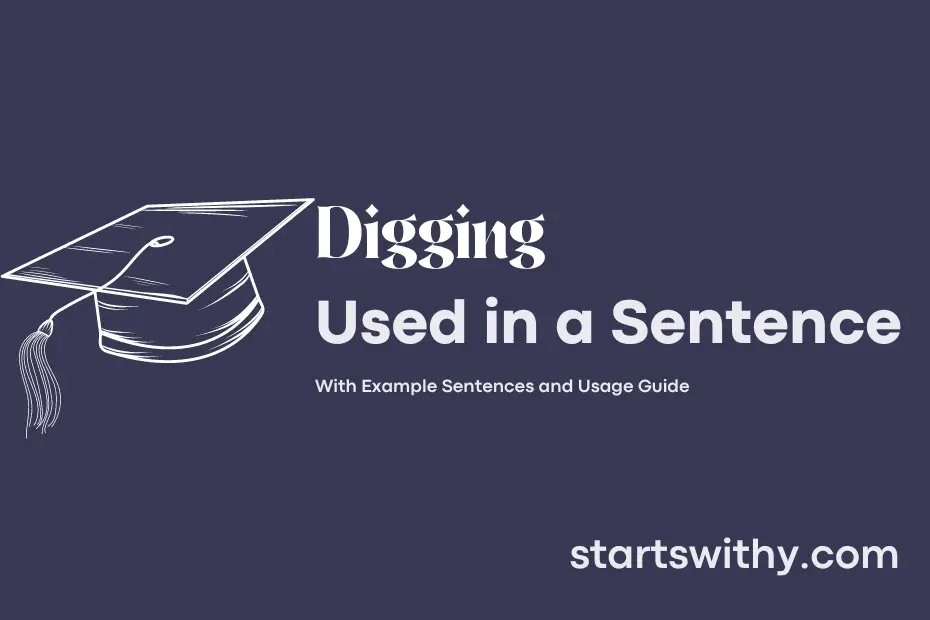Have you ever heard of gerunds in English grammar? A gerund is a verb form ending in -ing that functions as a noun. Now, let’s delve into how gerunds work, focusing on the usage of “digging” as an example.
When “digging” is used as a gerund, it represents the action of excavating or turning over soil. In a sentence, it can serve various functions like being the subject, object, or complement. This versatile form allows for a dynamic and flexible communication style in English writing.
7 Examples Of Digging Used In a Sentence For Kids
- Digging in the soil helps plants grow.
- Digging deep can find hidden treasures.
- People use shovels for digging.
- Some animals like to go digging for food.
- Digging a hole takes hard work.
- We can make sandcastles by digging in the sand.
- Digging can help us discover new things under the ground.
14 Sentences with Digging Examples
- Digging through old textbooks to find relevant information for your assignment.
- Searching for academic articles online involves digging through multiple databases.
- Library research often requires digging through various resources to find credible sources.
- Group projects may involve digging into different perspectives to create a comprehensive presentation.
- Digging into your notes from previous lectures can help reinforce your understanding of a topic.
- When preparing for exams, digging into past question papers can be beneficial for practice.
- Digging deeper into a complex theory can help you grasp its significance in the subject.
- Digging into the campus resources can lead you to valuable academic support services.
- Some subjects may require digging into historical contexts to understand the current trends.
- In research projects, digging into primary sources is essential for gathering authentic data.
- Digging into case studies can provide practical insights into theoretical concepts.
- To broaden your knowledge, digging into interdisciplinary studies can be enriching.
- Digging into online forums can help you engage in academic discussions with peers.
- Participating in academic conferences can offer opportunities for digging into emerging trends in your field.
How To Use Digging in Sentences?
To use the word Digging in a sentence, follow these simple guidelines:
-
Identify Action: Determine an action that involves using a shovel, hands, or other tools to break up and move soil, sand, or other materials.
-
Be Specific: Consider what is being dug, such as a hole, trench, or even buried treasure. Make sure to specify the object or area being worked on.
-
Provide Context: Add details to create a vivid image in the reader’s mind. Mention the location, time of day, weather conditions, and the purpose of the digging.
-
Use Proper Grammar: Construct a clear and coherent sentence that flows well. Check for subject-verb agreement, tense consistency, and correct word usage.
Examples:
– Present Tense: “I am digging a hole in the backyard to plant flowers.”
– Past Tense: “Yesterday, he was digging for hours to uncover the buried treasure.”
By following these steps, you can effectively incorporate the word Digging into your writing to convey a sense of physical labor, exploration, or uncovering hidden secrets. Practice using this word in various contexts to improve your communication skills and expand your vocabulary.
Conclusion
In summary, the examples of sentences with the keyword “digging” illustrate a variety of contexts where the action of excavating, searching, or uncovering is being described. Whether it is a literal act of digging in the ground, metaphorical probing into someone’s personal life, or investigating a topic deeply, the word “digging” is versatile in conveying a sense of exploration or inquiry.
From digging for buried treasure to digging into a complex issue, the word “digging” captures the essence of curiosity, persistence, and investigation. These sentences emphasize the importance of thorough research, thorough examination, and a willingness to unearth hidden truths or information, making “digging” an apt choice to express the depth and extent of exploration in various aspects of life.



